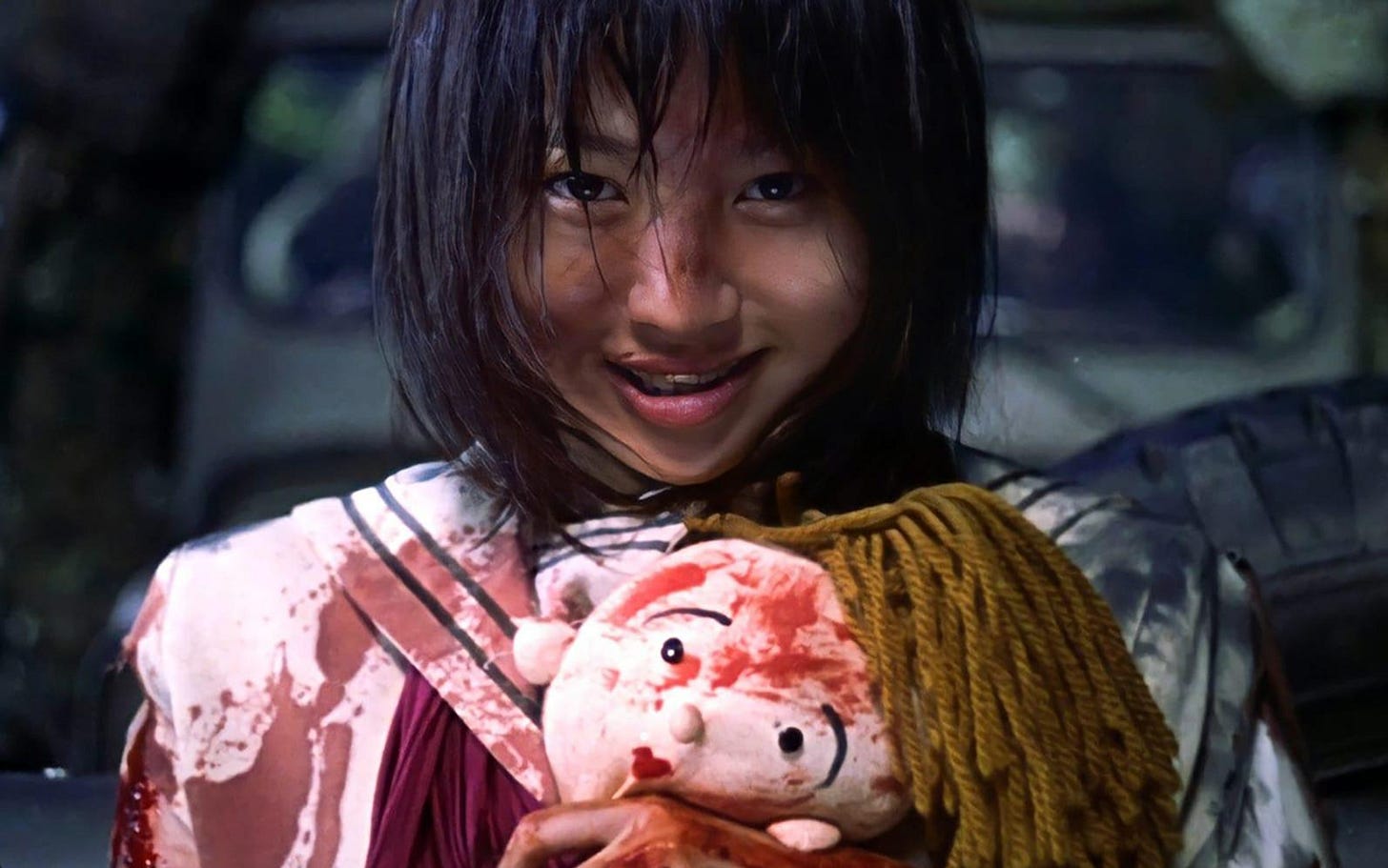Battle Royale
Stop me if you've heard this one before...
A near-future Japan. The economy has collapsed and the youth are in rebellion. the The government responds by passing the BR Act: a law that forces one randomly selected class of students each year to fight to the death on a remote island. The kids are provided maps, rations, and a random weapon. The rules are simple: the last kid standing wins. Some kids in a bus on their way to school fall asleep. When they wake up, they’re not at school; they’re on the island. They never saw it coming. In Battle Royale, the violence is not simple, and the emotional toll is staggering. It’s Lord of the Flies by way of Takashi Miike, with a dash of The Running Man and a tidal wave of teenage panic, not entirely unlike the also infamous House (1977).
There are movies that celebrate the passage of time and the comity of one generation passing the torch to the next. Maybe both generations can, gee I don’t know, learn something from one another. There are also movies in which one generation fucks another generation over. Battle Royale (2000) is the latter: a dystopian satire, a splatterpunk opera, and a scathing indictment of generational betrayal. Watching it nearly 25 years after its release is like finding an old scar that never quite healed. It’s how I imagine watching The Big Short (2015) might feel in twenty more years. It’s also a reminder of how outsized its influence has been on Western culture, from Shaun of the Dead (2004) to The Hunger Games books to Kill Bill (2003); its influence bouncing off of different artists like a pinball bouncing off walls.
When the film premiered in Japan, Battle Royale was radioactive. Politicians denounced it, critics didn’t know what to do with it, and some countries banned it outright. As always, controversy has a way of selling tickets. The film became a box office sensation where it was allowed to be scene, and a cultural flashpoint, grossing over $30 million globally on a modest budget. (The movie didn’t make any kind of premiere in the US until 2011.) Kinji Fukasaku, then 70, directed it with the fury of someone half his age and twice as angry. It was his last complete film before his death in 2003, and it's arguably his most explosive work.
The style is pure chaos. Fukasaku’s handheld camera work lurches through the underbrush, jolting from moments of eerie calm to sudden, balletic carnage. The editing is jagged, the pacing relentless, and the soundtrack (especially Masamichi Amano’s use of classical pieces) adds a haunting formality to the carnage. Underneath the frenzy is something more: a quiet, persistent heartbreak. This isn’t just a film about teenagers killing each other. It’s about what happens when adults stop protecting children and start weaponizing them instead.
Fukasaku knew the terrain well. As a teenager, he was conscripted into a weapons factory during World War II. He later recalled hiding under desks during bombings, surrounded by death. Battle Royale feels like the culmination of that trauma, refracted through pop cinema. It’s a movie about kids, made by someone who never forgot his childhood. A childhood of living in a world that had given up on him.
In the context of Japanese cinema, Battle Royale stands at a turning point: the tail end of the '90s J-horror boom, the rise of hyper-violent manga adaptations, and the continued growing globalization of Japanese pop culture. (Think: Nintendo and Playstation.) Interestingly, Fukasaku came from the old school: yakuza dramas, postwar thrillers. He died right as he was creating a new school.
What stands out most is how prophetic it feels, despite the premise. In 2000, the idea of a government turning kids into live-streamed killers was pure dystopia. Now it’s dystopia lite. Between Twitch, Fortnite, TikTok callouts, and social media pile-ons, we’ve built our own high-stakes youth arenas: no island required. We watch teenagers climb, fall, go viral, get doxxed, and repeat. We’ve normalized spectacle, and the easiest people to draft into the arena are our young. They never see it coming. .
Battle Royale
Written by Kenta Fukasaku; Directed by Kinji Fukasaku
2000
113 minutes
Japanese
Recommended way to watch (at time of publication): Streaming on Kanopy and Hoopla (Both free services with a public library card.)
You’ll like this if you like: Kill Bill (2003), The Hunger Games (2012), Lord of the Flies (1963), Snowpiercer (2013)

